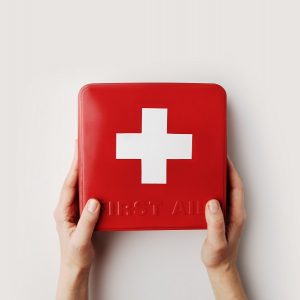Food Allergies and Adolescence – Play it cool while playing it safe
- 17 December 2019
Managing food allergies is not easy, especially during adolescence. But it’s still possible to go out and be yourself, while limiting the risk of an allergic reaction.
As a teenager, you face new challenges: physical changes, emotional ups and downs, the quest for independence, peer pressure… and if you live with food allergies, you also need to manage the risk of an anaphylactic reaction. This can be a huge challenge, but there are things you can do to make it easier!
First, a few explanations…
Did you know that deaths due to allergic reactions are more common among teenagers and young adults? [1] But why? Well, teenagers and adults make decisions differently; instead of assessing the risks as adults do, you concentrate on the potential benefits that could result from your choices [2].
For example, when going out with friends, the choice of whether or not to bring an auto-injector would depend mainly on your friends’ reactions. You may therefore be more inclined to take a risk and leave home without your emergency medication, so you can avoid questions and just be “like everyone else”. Does this type of situation sound familiar to you? Don’t worry, you’re not the only one…
Many teenagers and young adults admit to taking risks when it comes to managing their food allergies. In a study published in 2006, only 61% of adolescents and young adults admitted to always carrying their epinephrine auto-injector with them [3]. In addition, the same study found that 54% of participants, between the ages of 13 and 21, had knowingly consumed a food that was potentially dangerous to them.
So, is adolescence and safety automatically irreconcilable when it comes to food allergies? The answer is no. And here are some tips to help you manage the risks while playing it cool:
1. Inform your family and friends about your food allergies
When you enter adolescence and begin to stand on your own two feet, the management of food allergies gradually becomes your own responsibility and is no longer exclusively that of your parents. But it may seem difficult to reconcile this responsibility with the desire to be like others. Yet, the majority of teenagers living with food allergies believe that educating peers about the risk of fatality associated with food allergies would greatly simplify their lives [4].
So, don’t hesitate to let your friends and classmates know about your food allergies. Talk to them about the emergency medication you need to carry with you at all times and how to recognize an allergic reaction. Take the initiative. The more information your friends have, the better they will understand your situation, and the easier it will be for them to support you on a daily basis.
2. Surround yourself with friends who support you in managing your food allergies
If they understand the seriousness of your allergies, your friends will not want you to take any risks. By surrounding yourself with people who support you in your daily life, managing the risk of an anaphylactic reaction will be a lot less difficult. Your friends will feel reassured knowing you have your auto-injector with you. They will avoid remarks about you being different and they will choose safe restaurants for you. In short, they will make your life easier!
3. Make your requests clear and precise
In situations that may pose a risk, don’t hesitate to inform people about your food allergies. For example, when going out to dinner, make it clear to the waiter that you have allergies and make sure they understand what you are saying. Establish eye contact with the waiter and speak loud enough for them to hear you. If necessary, ask to talk to the waiter one-on-one. Above all, don’t hesitate to ask them questions if you have any doubts about the presence of one of your allergens in a dish.
4. Be proactive
Make a list of restaurants with a safe menu for you so you can suggest one to your friends when dining out. If you’re not sure, contact the restaurant in advance and ask about the menu and their policy on food allergen management.
Moreover, adolescence is often the time for first love and, consequently, the first kiss. Don’t forget that allergens can remain in a person’s mouth for several hours after eating. Kissing may therefore pose a risk to someone with food allergies, as discussed in our article on the subject. By getting the facts and understanding the whole picture, you’ll remain a step ahead of the game!
5. Remember that food allergies do not define you
It’s normal for your allergies to cause you social discomfort and make you feel like your life revolves around them. But it’s important to focus on the other aspects of your life, while simultaneously adopting good habits for managing your food allergies. Focus on what makes you, YOU. The traits that make you unique will make you shine: your personality, your talents, your strengths. People who are considered “cool” are often confident and aren’t shy to share their tastes, ambitions, and needs with others. By developing your identity apart from your allergies, they will take up less and less space in your life.
6. Take advantage of other teenagers’ experiences
Who better to understand what you are going through than someone your age also living with food allergies? Many of these young people share their experiences on blogs or at conferences for teenagers. Why not take the time to look them up and read what they have to say:
- The “WhyRiskIt”website shares how Canadian teenagers deal with their food allergies. It includes strategies, testimonials, information on anaphylaxis, and a blog.
- “Teen Faab” is another online resource for allergic teens by allergic teens.
Finally, did you know that Allergy Quebec has a support line (514 990-2575, ext. 204) to help you better manage your food allergies? Feel free to call us!
[1] Allan Bock, S., Muñoz-Furlong, A. et Sampson, H. A. (2001). Fatalities due to anaphylactic reactions to foods. Journal of Allergy and Clinical Immunology, 107(1):191-193. DOI 10.1067/mai.2001.112031
[2] Albert, D., Chein, J. et Steinberg, L. (2013). The teenage brain: Peer influences on adolescence decision making. Current Directions in Psychological Science, 22(2):114-120. DOI 10.1177/0963721412471347
[3] Allan Bock, S., Muñoz-Furlong, A. et Sampson, H. A. (2001). Fatalities due to anaphylactic reactions to foods. Journal of Allergy and Clinical Immunology, 107(1):191-193. DOI 10.1067/mai.2001.112031
[4] Monks, H. et coll. (2010). How do teenagers manage their food allergies? Clinical & Experimental Allergy, 40:1533-1540. DOI 10.1111/j.1365-2222.2010.0358







